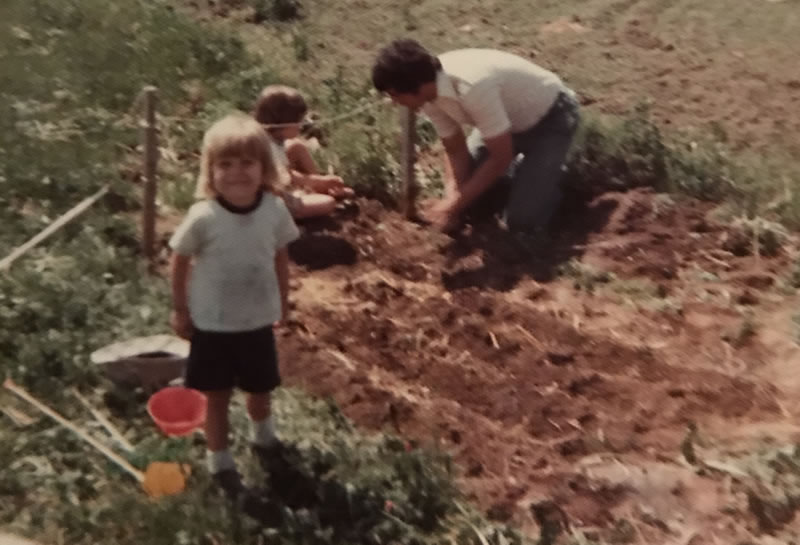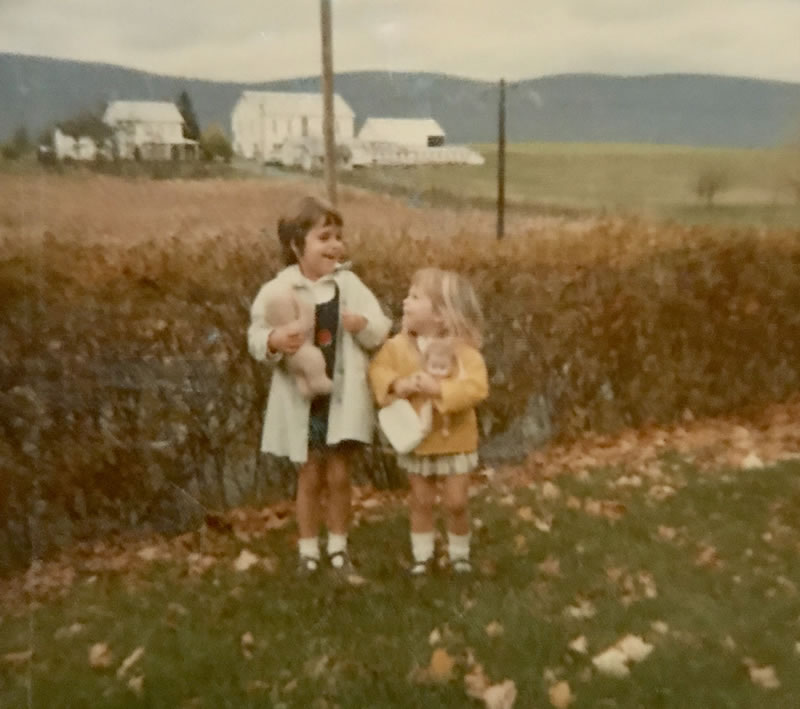
Melissa Ostrom in the garden.
I spent the first years of my life in Carlisle, Pennsylvania, and most of what I remember about that time involves me playing in the dirt like a hen taking a dust bath—digging in my mom’s vegetable garden, rolling around in the driveway, and stuffing gravel and clumps of soil into my baby brother’s cloth diaper, which was already sadly, er…full. I have photographs to corroborate some of my filth-related memories, though not, thankfully, of that last one, which requires no visual reminders, as the incident is seared into my brain on account of the spanking the deed earned me.
We were dirt poor, so I guess it made sense that dirt was my preferred medium. Plus, we lived in the middle of nowhere. Dirt was plentiful; friends, not so much. Fortunately, there was Lisa: She was around my age and lived close enough to join me in mudpie-making and puddle-jumping. Our other nearest neighbors were a houseful of rough and rowdy boys. They liked to boast, bray, swear, and swagger, and (similar to my brother’s diaper that one afternoon) they were full of shit, lying readily, frequently, and extravagantly.
One of their tall tales became legendary in my family. I don’t know much about the story, only that it had to do with a chicken farm (an enterprise my family, later, in private, agreed probably never existed). What I do know, however, is, not long after sharing their chicken farm story, the boys told another tale, but this one didn’t mesh with the details of the earlier account. When my parents called them out on the discrepancy, one of the brothers hesitated, then said, “Well, that was before the chicken farm.”

Noelle, Lisa, and I torturing my baby brother.
From then on, whenever anyone in my family got caught telling a fib or breaking a promise and had no other way to wiggle out of trouble, he or she would try to defuse the embarrassing situation with a nervous ha-ha and a mumbled “That was before the chicken farm.” For instance, say I had gone on and on about how I was going to give up junk food and get serious about downing some daily doses of carrot sticks and celery stalks. If, on the following afternoon, someone (my big sis, perhaps) caught me eating kettle-cooked potato chips and drinking root beer in bed while rereading a favorite paperback romance, I might have answered her “But I thought you were going on a diet!” with “That was before the chicken farm.”
A useful phrase. A way of diverting attention from the fraught fiasco at hand.

Melissa and her big sis.
Our silly family punchline makes me think of the plot device called deus ex machina. Meaning “god from the machine,” it was originally a central component in Greek drama: at a point of great tension in a play, a crane would deliver to the stage the character who was playing a god so that he or she could perform a miracle and thereby solve the seemingly unsolvable—in short, clear up the stickiest of storyline messes.
Today, a deus ex machina is more likely to refer to a sudden solution that a writer contrives in order to fix a muddle in the narrative. This resolution usually comes out of nowhere and, therefore, is super unlikely. The villain has tied up the protagonist and left her to freeze to death in the snowy wood? Never fear. Unbeknownst to the reader (and, quite frankly, unbeknownst to the writer, as well, until she reached this dead-end in her WIP and came up with a shoddy solution), Librarian Susan, the shivering main character, is a former CIA agent. And while Count Sinistrato fashioned the knots, she knew to tuck her elbows close to her ribs and therefore gave herself some false space through which to free her wrists. Problem solved! And she lives happily ever after.
Blehk.
Novels, stories, plays, even films can employ a deus ex machina. The fairy godmother functions as one in fairytales and folktales. An argument could be made that the naval ship at the end of Lord of the Flies is also a deus ex machina. Even the final scene of Hamlet, my favorite Shakespeare tragedy, strikes me as a little too pat—how Fortinbras just happens to show up to restore order immediately after Hamlet, King Claudius, Laertes, and Queen Gertrude die and Denmark, not only rotten but now also leaderless, teeters toward chaos. And I wonder about Benicio Del Toro’s character in The Last Jedi, too. Is it just me, or does he have deus ex machina written all over him—not because he saves the day but because his belated appearance in the movie feels so…contrived, a ploy to make the ending possible?
One problem with any deus ex machina is it strains believability, and it does so because REAL LIFE DOESN’T WORK THIS WAY. Even when we pray for a miracle or beg for God to intercede or hope for a fairy godmother to show up, we’re not holding our breath. We know damn well that if we’re facing financial ruin, our best bet is to take on a second and maybe even a third job—not wish upon a shooting star.
This plot device also undermines the strength and volition of the main character. A protagonist may find herself in any number of pickles. The fun—for the reader—comes in discovering how the character disentangles herself from her difficulties. Or doesn’t. That’s a possibility, too.
Finally, this plot device looks sloppy. I have nothing against pantsers. I’m usually one, myself. But I do think a writer (upon finding his or her narrative coming to a screeching halt) should go back, revise and refine the plot, and do whatever he or she must in order to avoid relying on a farfetched, out-of-the-blue solution to a problem.
When the conflict comes to a head, as long as the author has planted seeds beforehand—added the necessary objects, interactions, and events throughout the first part of the work—that conflict can be resolved internally. And a major plot twist, while surprising, will nevertheless possess a quality of credibility.
Surprises are good! I like being surprised when I read. What I don’t like is feeling tricked.
Fixing the plot might require a major revision or only a few tweaks. Prior to that tied-up-and-tossed-into-the-snowy-woods scene, the writer could suggest, from time to time, in small but significant ways, that the main character isn’t what she seems—an ordinary librarian—by hinting at her old position as a CIA agent operating in Russia: Susan stubs her toe and inadvertently swears in a foreign language. She prefers her vodka well-chilled and straight—a fifty-gram shot of it. Once, having accidentally left her keys at home, she picks the library door’s lock, then deactivates the alarm, to boot.
I kind of like the idea of a spy-turned-librarian. Why did Susan leave the agency? How has her secret past shadowed her current situation? The backstory will raise all sorts of questions. But questions galvanize a story. They propel a plot. They keep a reader reading. Of course, the backstory is bound to alter the novel altogether, but that, too, might be a good thing.
It sure beats pulling a chicken farm out of thin air.

Melissa, outside of your mother, I’m probably the only person alive who could explain the origin of “that was before we got the chicken farm.” When your Uncle Billy was about eight years old he was extremely excitable. He had a friend named Mark Cimero (sp.) who was known was telling tall tales and outright lying. When your Grandfather purchased about six chickens Billy ran about telling everyone about his father’s acquisition. When he ran into his good friend Mark he yelled “we have six chickens!!!”. Mark immediately replied: “that’s nothing we have A thousand chickens”. Billy immediately replied: “you told me you never had any chickens!!”. To which Mark replied: “that was before we got the chicken farm!!!”. I still use that line be it ever so esoteric! In regard to the family that lived across the street from us when we lived on Corman Rd. In Carlisle Pa., their last name was Nydick and as you noted they were deplorable in every way. O day you and your sister Dtood o your side of the street, the Nydick boys on the other. I was in the back yard when I heard the Nydick boy shouting every swear word ever know to man. As a ran toward the confrontation I heard your sister yell one word in reply to the dirtiest language I had ever heard: BUTTERFINGERS! I love you Melissa! Dad